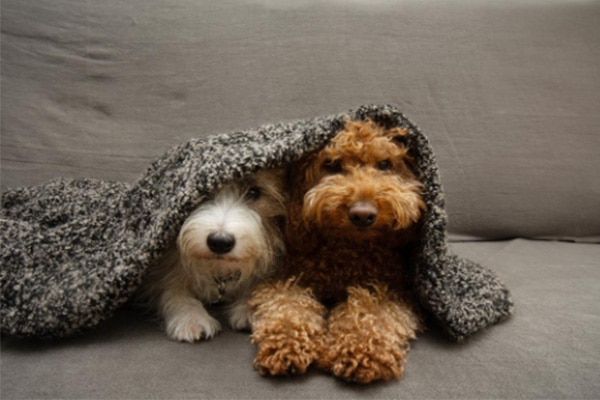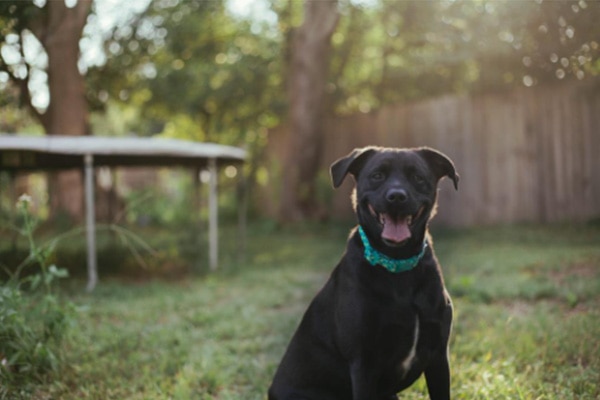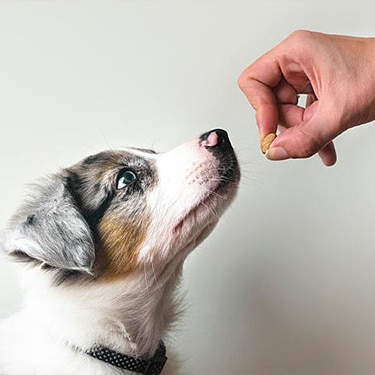

It's only natural to want to include your dog in festive outdoor fun, but dogs and fireworks don't always pair as well as you might hope. If you've ever seen your pup cower at the sound of thunder, you already know dogs can be fearful of various noises. Dogs have a remarkable sense of hearing, which can make those loud booms even more startling. And, as with lightning, the bright flashes of light that accompany fireworks can add to the stress.
If your dog runs for cover at the sound of a firecracker, read on to learn how to get dogs used to fireworks to reduce discomfort and other strategies to help them relax.
Why Are Puppies Afraid of Fireworks?
Some puppies are born with a genetic predisposition toward fear. However, fear typically occurs with unfamiliar experiences. "Fear periods," which describe periods when stressful experiences may prove overwhelming, are part of normal puppy development. During this time, you may notice your puppy startles more easily or overreacts to seemingly neutral situations.
Socialization goes a long way toward helping puppies overcome stressful behaviors during these fear periods and beyond. That means you have a great opportunity to reduce — or even prevent — puppy fireworks fears by helping them learn to deal with the unexpected.
How Should I Expose My Puppy to Fireworks?
The key to reducing fear of fireworks is to expose your puppy to similar noises in a gradual, controlled manner (desensitization) and associate the sounds with something pleasant and positive (counter-conditioning). Safely exposing your dog to fireworks sounds can help prevent fearfulness as an adult.
Don't wait until July 4th to start training. Play a recording of fireworks sounds (or something similar, like thunder) on low volume and offer your puppy a yummy treat. As your dog adjusts, gradually turn up the volume and continue offering treats. Try multiple short training sessions per day ahead of the event.
Look for organic opportunities to teach puppies how to deal with unexpected noises early, too. If your puppy is startled or concerned by a loud noise, give them a treat. This teaches them loud booms make treats rain from the sky, which is hardly something to be afraid of!
How to Relieve Your Dog's Stress From Fireworks
If your dog's scared of fireworks, you can take steps to help them relax and feel safe.

Do's
Do Reduce the Noise
Close the windows and draw the curtains to help muffle loud noises. If you have crate trained your dog, try shutting them inside the crate and covering it with a blanket to provide an added sense of security. If part of your house is more insulated from outside sounds, such as a basement, keep your pup company out of earshot. You can also turn on the TV or play white noise on your phone to help drown out the sounds.
Do Secure Fences
More dogs get lost on July 4th than any other day of the year, likely in part due to firework fears. Before letting them out for potty breaks, check your canine enclosure to make sure all gates are securely closed and there aren't any escapable openings. Ensure they wear a properly fitted collar and tag and that your pet microchip up-to-date in case they manage to get loose.
Do Tire Them Out
Provide your dog with plenty of exercise earlier in the day to expend extra energy that could add to their stress when the fireworks start.
Do Offer a Distraction
Provide a fun distraction, such as a favorite chew or puzzle toy filled with their favorite treat, to occupy their attention during the show.
Do Provide Comfort
If your dog seeks your attention, offer them comfort. Let them hide their face in your arms. Empathy won't reward fear or worsen stressed behavior.
Do Try a Snug Vest
Close-fitting wraps are designed to give dogs a snug hug, which can help them feel secure. Pressure from snuggling in your arms or squeezing behind furniture can help calm fear behaviors, too.
Do Consider Calming Remedies
Some dogs may benefit from over-the-counter stress-reducing pheromone products like Adaptil or nutraceuticals containing L-tryptophan or L-theanine. Always try these products in advance of the event, and run them by your veterinarian first. You can also try music designed specifically to calm pets, such as harp music.
Don'ts

Don't Bring Your Dog to a Fireworks Show
Don't let your pup tag along to a fireworks display — no matter how much you'd love them to be there.
Don't Let Them Roam Free
Don't let your dog off-leash outside a fenced-in area during fireworks season. If they get spooked, they could run off and become lost.
How to Get Dogs Used to Fireworks
If you have an adult dog, it's not too late to desensitize them. Training can take time and patience, however, so start months before you expect fireworks. Use the same technique as for puppies. While your dog is engaged in an activity they enjoy, like cuddling or eating a dog treat, play a recording of fireworks for 20 to 30 minutes. Adjust the volume low enough so it doesn't change your dog's behavior. Do this once a day, every day, for a week.
After a week, gradually raise the volume — but don't push it. If they seem afraid, turn the volume back down and continue at a slower pace. As long as your dog shows no stress, maintain the volume for 20 to 30 minutes a day for a week.
Repeat the following week, further increasing the volume. Pair listening with special treats (reserved for special occasions) or games your dog adores so they associate this with the noise. Keep practicing until your dog can hear the video at a loud volume without becoming afraid.
Let Your Dog Celebrate in Peace
If these solutions for dogs and fireworks don't help, your vet can recommend options for your dog's needs. Just remember: When the fireworks start, it's best for your pup to call it a night. Providing a safe, quiet place for them to relax is one of the best ways to give your dog a happy holiday.




















